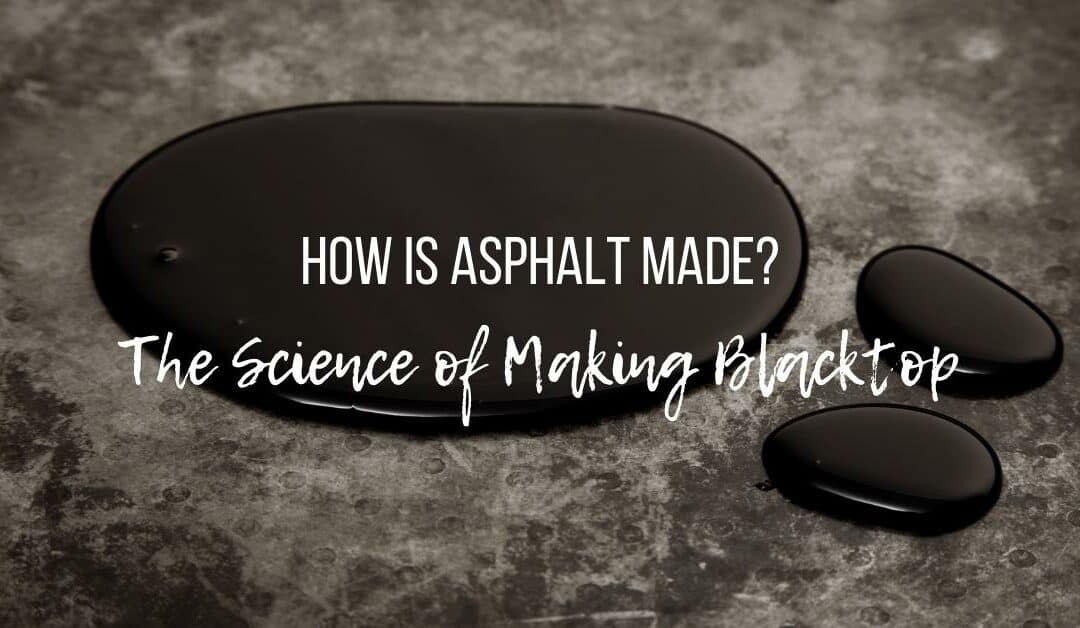You’re not alone if you’ve ever asked, “How is asphalt is made?” It’s a question many people have, and for good reason – blacktop is a crucial part of our everyday lives. Roads, parking lots, and driveways would be nothing without this material!
In this blog post, we’ll take a look at the science of making asphalt pavement. We’ll examine how it’s obtained from natural deposits or as a byproduct of the petroleum industry and how paving contractors use it to create blacktop. And we’ll see the history since ancient times!
What is in an Asphalt Pavement Mixture?
Asphalt, also known as mineral pitch, is obtained from either natural deposits such as native asphalt or as a byproduct of the petroleum industry (petroleum asphalt). The asphalt binder holds crushed rock and gravel (aggregate) together.
Depending on the asphalt project, companies offering asphalt pavement products combine differing amounts of binder (asphalt), crushed stone, sand, and gravel (aggregate).
Often, companies produce products incorporating RAP or recycled asphalt product. RAP is made of chunks of asphalt milled from old roads and reprocessed for use in paving roads for new asphalt pavement projects.
The product we see is a mixture commonly known as “blacktop.” Blacktop is the asphalt pavement that makes up our parking lots, roads, driveways, and more.
What is “Native Asphalt?” Where Can You Find It?
Native asphalt is a form of natural bitumen (oil) that occurs naturally in nature. We find naturally occurring asphalt in certain areas, such as Alberta and the Arabian Peninsula. Typically, the dark brown native asphalt deposits are located near the surface in oil fields, although deeper deposits can also occur.
Obtaining this material relies on specialized mining equipment and involves extracting it from natural sources. After the extraction and oil refining process, workers load the material onto trucks and transport it to an asphalt production facility. There, it undergoes further refinement to become its final products.
How is Asphalt Made?
Asphalt processing plants, heat native asphalt using large tanks until it liquefies into a thick tar-like substance called bitumen. Vacuum distillation is the name of this process.
The asphalt manufacturing process begins when workers obtain the asphalt binder in crude oil form from natural deposits or petroleum refineries. They then mix this refined asphalt binder with aggregate.
After the initial distillation, the plant mixes the liquid bitumen with an aggregate blend formulated to meet specific requirements. Companies often add modifiers such as fiberglass fibers or liquid rubber to an asphalt surface, improving performance characteristics like ductility and resilience.
This combination of bitumen and aggregate then goes into specialized mixers, where it heats until the asphalt reaches a workable consistency. This produces a hot mix asphalt (HMA) material.
The HMA material created in this process consists of a combination of heated and mixed bitumen and minerals, forming a black semi-solid mass used for applications ranging from road construction to roofing materials. Companies use different grades and types of HMA depending on the type of project.
Blended asphalt goes to the building sites where contractors may use it in pavement projects. Asphalt can also undergo additional processing depending on the needs of the project.
At job sites, contractors lay HMA down in layers over an existing surface or base. They use a paving machine that distributes and levels out the material to create the roadway or parking lot.
The final step in making asphalt pavement is compacting it with a roller. This compaction process ensures that all of the air pockets dissipate and that the surface of paving asphalt is even and smooth.
From start to finish, quite a bit of science makes asphalt possible- but thanks to modern technology, manufacturers can produce asphalt quickly and efficiently. With its practicality and durability, today’s asphalt continues to be an essential part of our everyday lives.
What Types of Asphalt Pavement Are There?
Asphalt pavement is generally one of two types: hot-mix paving or cold-mix paving.
Hot-mix asphalt pavement goes through a heating process, mixing the liquid asphalt with crushed stone and gravel. Contractors lay the hot asphalt cement mixture on the roadbed and compact it to form the asphalt pavement.
The cold-mix process involves mixing emulsified or cutback asphalt with aggregate materials before laying it down. Contractors typically choose this process for smaller projects, such as patchwork.
Cold-mix and hot-mix asphalt products are both viable options for creating blacktop. One significant disadvantage of cold-mix asphalt is that it doesn’t offer the durability of hot-mix asphalt. And the advantages of hot mix asphalt include:
- Greater uniformity
- Smoother finish
- Better resistance to wear
An experienced asphalt paving contractor can help you with asphalt installation and choose the best type of asphalt for your project. No matter what asphalt mixtures you choose, the asphalt industry creates – our major thoroughfares, secondary roads, parking lots, driveways, pathways, and more!
What is the History of Asphalt Pavements?
Asphalt is not new – it has been around for thousands of years. Ancient civilizations in Egypt, Babylon, Assyria, and Mesopotamia used asphalt to waterproof their ships, buildings, and baths. The Romans also used asphalt as a binder in the roads they built throughout their empire.
In modern times, asphalt production got its start on the East Coast of the United States around 1870. By the 1920s, road makers used hot-mix asphalt for use in road projects nationwide. Since then, we’ve seen significant advancements in both cold-mix and hot-mix asphalt pavement products – paving the way for safer and longer-lasting blacktop surfaces!
Final Words
As you can see, many steps exist in making asphalt paving mixtures- from mining native deposits to refining asphalt, to blending and modifying materials for pavement projects. That’s why experts need to understand all aspects of asphalt production when selecting products for their asphalt paving projects.
It’s essential to keep in mind that asphalt pavement isn’t a one-size fits all solution. Different projects require different asphalt mixes, and there are many considerations when choosing which mixture will be best for your particular project.
Now that you know more about the science of making asphalt, hopefully have a better understanding of this complex material. Asphalt is an essential part of building roads and other paved surfaces. It’s an incredibly durable material that can withstand the toughest conditions – from extreme weather patterns to heavy vehicle traffic.
With a bit of maintenance, asphalt can stand up under decades of wear and tear! Blacktop is sure to make your next paving project successful!
Experienced Asphalt Paving Services in Columbia, SC Area
Are you looking for experienced asphalt paving services in the Columbia, SC area? If so, be sure to contact AMP Paving. We have the experience needed for your private and commercial asphalt paving projects.
Our team provides top-notch services that exceed expectations. From residential driveways to commercial parking lots and roads, we can easily handle any project. Contact us today for more information on our asphalt paving services!

